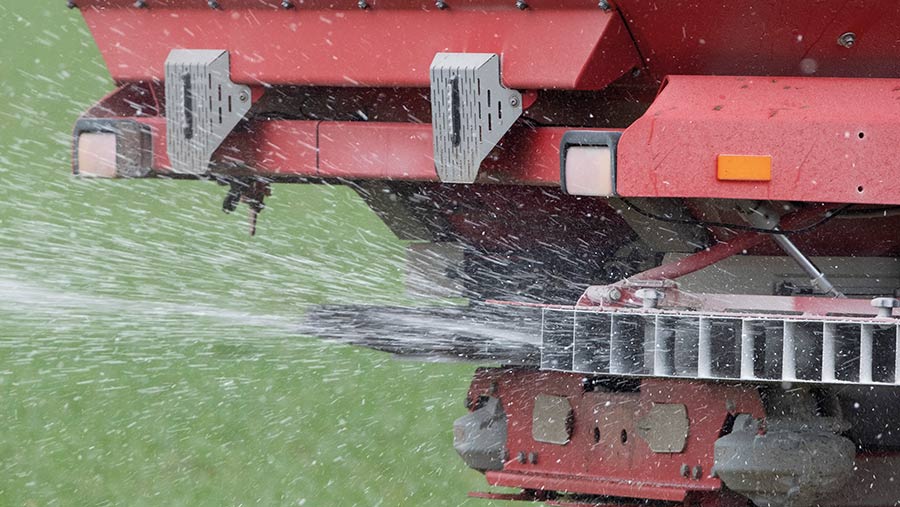Tesco to trial low-carbon fertilisers with five growers
 © Tim Scrivener
© Tim Scrivener A large-scale commercial trial to find cheaper low-carbon alternative fertiliser products has been launched by Tesco, after a year of high and volatile prices in the conventional fertiliser market.
The supermarket chain aims to grow and sell 70,000t of vegetables later this year and 200,000t in 2024, which have been grown in the UK using low-carbon fertilisers.
Five large UK growers are involved in the rollout, namely Branston, G’s, Stourgarden, Huntapac Produce, and TH Clements.
See also: How starter fertiliser can raise pulse yields by 17%
With 60% of fertiliser products currently being imported into the UK, the trial aims to find new products that are less reliant on global markets, able to improve food security, and lower greenhouse gas emissions on farm.
The trial will cover 1,300ha in 2023 and includes eight different low-carbon fertilisers, with scale-up plans for 2024 to cover more than 4,000ha.
Trials on wheat, barley, and grasslands for livestock are also planned by the retailer.
Innovative ways
Sarah Bradbury, Tesco’s group quality director, said: “Delivering more affordable, sustainable food means finding new, innovative ways to grow basket staples such as potatoes, salad vegetables and carrots.
“Fertilisers are a large source of emissions in farming, but high prices and uncertainty have made it hard for farmers to take advantage of low-carbon alternatives.
“We hope that by working with our suppliers, our learnings from this rollout of low-carbon fertilisers can prove their potential.”
Stephen Shields, technical director at grower Huntapac Produce, said: “By moving to these new low-carbon technologies, we can save money compared to chemical-based fertiliser. At a time when all costs are going up for farmers, any steps that reduce them are ideal.”
What cheap alternative fertilisers are coming to the UK market?
Fibrophos, JSE Systems
Fibrophos is a phosphorus and potash fertiliser, produced by incinerating chicken litter. The base grade end product works out at about 30-40% cheaper for a kilo of nutrition than conventional bagged fertiliser.
Sales direct Steve Welbourn said there are also a lot of secondary trace elements available that you wouldn’t get in bagged fertilisers, and high sulphur and calcium content.
“All the nutrition that is in wheat, barley and maize, passes through the chickens and is still available as an element in the litter,” he explained.
The product is available to buy now, but has limited quantities due to demand.
Phos Cycle
The company works to reuse phosphate and sulphate from expired fire extinguishers to produce fertilisers through a patented process that creates a zero-carbon, water-soluble phosphate product at a comparable price to conventional fertiliser.
It is currently in the scale-up phase and has created a 50t trial with Tesco, while a commercial plant is being built in the UK, able to produce 10,000t each year.
Trials with Niab on winter wheat, spring wheat, and potatoes have found a slight increase in performance compared to other fertilisers.
Helias Andriessen, company director, said: “Our patented technology processes expired ABC powder into a sustainable, clean, low-carbon fertiliser [NPK+S], producing the same performance as its virgin alternative, while assisting farmers in reducing their carbon footprint on farm.”
Poly 4, Anglo American
Poly4 is an organic, low-carbon fertiliser produced by mining company Anglo American, which is created using the mined mineral polyhalite. Potassium, calcium, sulphur and magnesium are also in the end product.
Anglo American is still in the early stages of building the mine in Whitby, North Yorkshire, and how the product will be priced commercially is not yet known.
However, it is expected to be available on a large scale once the project is completed.
Maurice Rankin, corporate communication manager, said: “Unlike more normal fertilisers, it is very low carbon.
“There are no fossil fuels or anything used in its production, it’s just rock that is extracted, ground up and then granulated, that can then be used in the same way as a normal fertiliser.”
CCm Technologies
This firm produces an organo-mineral fertiliser in pellet form that is carbon net zero. CCm Growth fertilisers can work out cheaper than conventional fertiliser due to improved nutrient delivery.
It is created using waste CO2 from industry, ammonia from the waste sector, and fibrous material from food waste and sewage sludge.
Pawel Kisielewski, chief executive officer at CCm Technologies, said: “Independent field trials have proven that for certain crops, mainly cereals, you can actually apply 20% less and get the same yield outcomes.
“So, there will be a practical benefit to farmers and they won’t need to buy as much fertiliser.”
R-Leaf, Crop Intellect
R-Leaf is a product that captures pollutants in the atmosphere, such as nitrogen oxide, and then breaks it down into nitrates, which aids plant growth.
Apostolos Papadopoulos, founder of Crop Intellect, said the recommended retail price in the UK is set at £30/litre, with a recommendation to use 2 litres/ha on cereals.
For wheat, it is recommended to be applied at T1 and T2.
“If the farmer is reducing the nitrogen application, for instance by 25%, they are making a saving straight away. If not, then we have seen yield benefits in large-scale commercial farm trials, so they are entertaining a good ROI,” said Dr Papadopoulos.
Bio-F Solutions
A biofertiliser product that can also be used on organic and conventional soils, which is produced by growing algae.
The product releases nitrogen at a slower rate than conventional fertiliser and requires less applications.
Veolia
The company uses food waste and anaerobic digestion (AD) plants to produce organic fertilisers.
Veolia processes more than 3m tonnes of materials each year and runs 126 AD plants and composting facilities across seven different countries. This allows it to produce 1m tonnes of fertiliser each year.
Major fertiliser manufacturer Yara works in partnership with Veolia to produce organic mineral fertilisers suitable for use in regenerative agriculture.
This fertiliser is already commercially available and can be purchased through Yara at a competitive rate.
